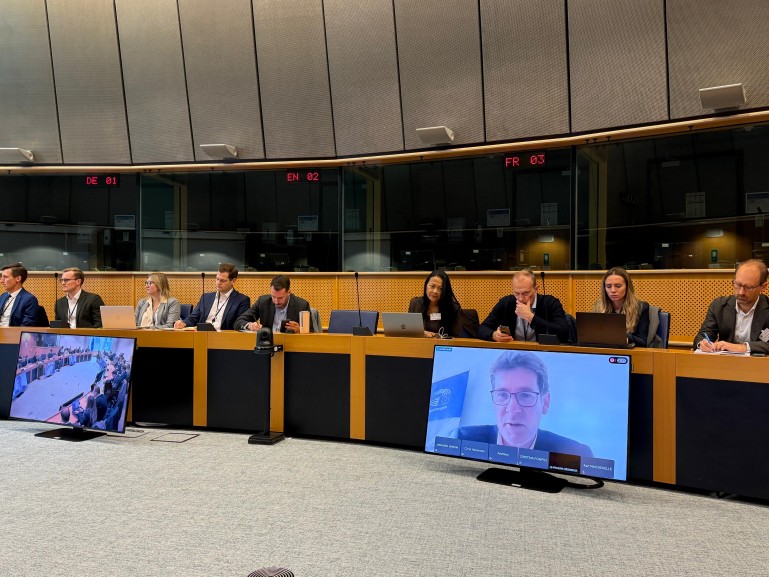

14.11.2025
Following the publication on 21 October of the European Commission’s proposal to simplify the EUDR, several important exchanges took place with key supply-chain actors. In this article, ATIBT reports on the conference held in the European Parliament at the invitation of Pascal Canfin, analyses the Commission’s proposals – some of which would be highly problematic in their current form – and presents the orientations we are collectively advancing within the cross-sector coalition.

Briefing at the European Parliament
Last week, ATIBT took part in a conference organised at the invitation of Pascal Canfin (Ex-Chair of the ENVI Committee of the European Parliament) and co-organised with the cross-sector coalition representing the timber, cocoa, coffee, palm oil, rubber and food industries.
The purpose of the meeting was to review the state of play of EUDR implementation, ahead of the planned application date, and to react to the simplification package published by the Commission.
The key converging messages were:
A transcript of the conference, as well as the cross-sector statement finalised after these discussions, is attached to this newsletter.
Our analysis of the Commission’s simplification proposal
In its 21 October proposal, the Commission put forward two main changes:
They would be exempted from submitting a full Due Diligence Statement (DDS) and instead provide an annual simplified declaration, only in “low-risk” countries.
Only the first placer on the EU market would be required to submit a DDS.
Downstream operators would no longer submit any DDS and would be responsible for maintaining traceability by collecting and transmitting DDS reference numbers along the supply chain.
Although the stated objective is to reduce administrative burden, several measures appear poorly designed. In particular, the obligation to transmit multiple DDS numbers throughout the transformation chain would be extremely difficult to manage and operators are not equipped for this.
Rather than simplifying, this approach would create an explosion in the volume of data, unmanageable for transformed or mixed products (paper, furniture, chocolate, etc.).
More broadly, several elements of the proposal do not match the operational realities of supply chains and would risk creating more confusion than simplification.
To help operators understand the implications of these changes, a comprehensive FAQ is attached to this newsletter.
ATIBT’s position and recommendations
Our proposals were formulated directly in response to the Commission’s proposals, precisely because some of them, if adopted as they stand, would create major complications for operators – particularly within the tropical timber sector.
ATIBT promotes a pragmatic approach structured around four principles:
The EUDR should enter into force as planned. A general delay would only prolong uncertainty.
This period would allow:
This foundational responsibility must not be diluted.
Contrary to the Commission’s proposal, the coalition – and ATIBT – support a more realistic model:
This approach preserves the coherence of the EUDR while avoiding an administrative burden that would be unmanageable for operators.
Next steps
ATIBT will continue, within the cross-sector coalition, to advocate for an EUDR implementation that is ambitious, realistic and operational, and to propose targeted adjustments where needed to avoid counterproductive effects.
Further awareness-raising and dialogue with EU institutions will take place in the coming weeks.